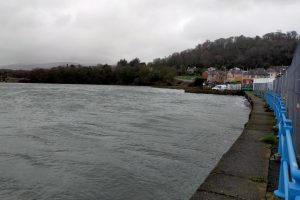THE RENEWABLE energy sector in Wales is set to benefit as Natural Resources Wales (NRW) introduce a new tiered charging system for  hydropower licence applications this week. This will mean that licence application fees for the smallest hydropower schemes will start at £375 per application with the larger, commercial schemes, paying £1,500.
hydropower licence applications this week. This will mean that licence application fees for the smallest hydropower schemes will start at £375 per application with the larger, commercial schemes, paying £1,500.
The new scheme has been developed as part of NRW’s wider Fees and Charges Scheme following an extensive consultation with stakeholders including those from the hydropower industry, farming unions and conservation bodies. Ceri Davies, Director for Knowledge, Strategy and Planning, Natural Resources Wales, said: “Hydropower schemes can help farmers, landowners and community groups be more economically and environmentally sustainable. We make sure that these schemes can be developed without damaging rivers, the wildlife that lives there or from aff ecting others who rely on the water. By keeping our charges as low as we can, especially for the smaller schemes, this should encourage more people and groups to see if harnessing the power of nature can work for them.”
As well as the changes to charges for hydropower, other changes include: • 2.5% rise to permitting charges for waste sites and installations like power stations • 10.4% reduction to the standard unit charge for water abstractions • a new £350 charge for reassessment of waste recovery plans • a capped permit subsistence charge of £3190 for sites in preconstruction • New annual charge of £2,065 for recycling facilities. Natural Resources Wales has reviewed the fees it has to charge for environmental permits and is duty bound to recover the costs of regulation from business and industry rather than the taxpayer footing the bill. Welsh Government is providing fi nancial support that reduces the impact on Wales’ growing hydropower industry.
Minister for Natural Resources, Carl Sargeant said:“We need to ensure that we use our natural resources in ways that protect them in order so they can provide for future generations, and investing in hydropower generation is a great example of this. I am pleased we have been able to support Natural Resources Wales to implement these changes in the charging regime, and hope this can lead to more schemes, particularly those smaller in scale, harnessing the power of Welsh waterways.” Ceri Davies added:“Applications for hydropower schemes are on the rise in Wales. We have seen a 10- fold increase in the last 5 years with water abstraction licences for 87 new schemes issued last year.
The efficiencies and improvements we have made to the application system has halved the amount of time we take to assess a licence and we will continue to work with the industry to improve this further.” This is NRW’s fi rst Fees and Charges Scheme and it will be in place for the next financial year. Future changes will be determined by NRW continuing to drive efficiencies throughout the business and by the wider fi nancial picture.
















Add Comment